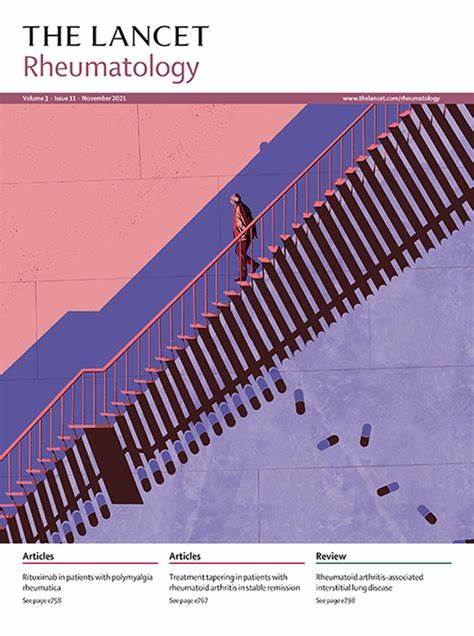Serum biomarkers associated with baricitinib response in patients with juvenile idiopathic arthritis: a post-hoc analysis of the phase 3 JUVE-BASIS trial
IF 16.4
1区 医学
Q1 RHEUMATOLOGY
引用次数: 0
Abstract
Background
Baricitinib has previously been shown to improve clinical response in patients with juvenile idiopathic arthritis (JIA) in the JUVE-BASIS trial. In this post-hoc analysis we aimed to identify whether pharmacodynamic changes in serum biomarkers in response to baricitinib treatment could help reaffirm the clinical utility of baricitinib in patients with JIA.
Methods
JUVE-BASIS was a randomised, double-blind, placebo-controlled, withdrawal, efficacy, safety, phase 3 trial, done in 75 centres in 20 countries. Eligible patients were children and adolescents (aged 2 to <18 years), with polyarticular JIA (positive or negative for rheumatoid factor), extended oligoarticular JIA, enthesitis-related arthritis, or juvenile psoriatic arthritis, as per the International League of Associations for Rheumatology criteria and an inadequate response (≥12 weeks) or intolerance to one or more conventional synthetic or biological disease-modifying antirheumatic drugs (DMARDs). Here we report post-hoc analyses of serum samples from patients who received open-label baricitinib in the 12-week lead-in period of the JUVE-BASIS trial. Samples were assessed using an Olink Explore 3072 panel at baseline and week 12. Baricitinib-mediated pharmacodynamic changes in serum protein markers were measured as changes from baseline to week 12 derived from a mixed model with repeated measurement. Pearson correlations of the change in serum biomarkers and clinical disease activity (JADAS-27 scores) comparing baseline with week 12 were examined. Proportional changes in biomarkers were classified into three response subsets based on JIA-ACR response rates: JIA-ACR <30% (non-responders), JIA-ACR 30–70% (responders), and JIA-ACR 70–100% (super-responders). People with lived experience of JIA were not involved in the design or conduct of this study. The JUVE-BASIS trial was registered with ClinicalTrials.gov, NCT03773978, and is completed.
Findings
Between Dec 17, 2018 and March 3, 2021, 220 patients were enrolled in JUVE-BASIS and received at least one dose of baricitinib in the open-label lead-in period. In this post-hoc analysis, 168 serum samples from 84 patients were analysed: 67 (80%) of 84 patients were female, 17 (20%) were male, 67 (80%) were White and the mean age was 14 years (SD 2). 10 (12%) of 84 were non-responders, 27 (32%) were responders, and 47 (56%) were super-responders based on clinical response. Several serum biomarkers showed significant changes following 12 weeks of baricitinib treatment for all patients with higher magnitude changes seen in responders and super-responders. Changes in biomarkers associated with macrophage activation (CCL7, CCL18, and IL-6) and regulation of matrix composition (matrix metalloproteinase-3) were positively correlated with clinical response.
Interpretation
To our knowledge, this is the first study measuring serum protein markers in the context of an intervention trial with baricitinib in patients with JIA. Associated biomarker changes with clinical response might allow physicians to potentially identify patients who are most likely to be responsive to baricitinib treatment.
Funding
Eli Lilly and Company under licence from Incyte.
青少年特发性关节炎患者与巴西替尼反应相关的血清生物标志物:一项对JUVE-BASIS试验的事后分析
背景:Baricitinib先前在JUVE-BASIS试验中被证明可以改善幼年特发性关节炎(JIA)患者的临床反应。在这项事后分析中,我们旨在确定baricitinib治疗后血清生物标志物的药效学变化是否有助于重申baricitinib在JIA患者中的临床应用。方法:JUVE-BASIS是一项随机、双盲、安慰剂对照、停药、疗效、安全性的3期试验,在20个国家的75个中心进行。研究结果:在2018年12月17日至2021年3月3日期间,220名患者入组juv - basis,并在开放标签导入期间接受了至少一剂巴西替尼。在这项事后分析中,分析了84例患者的168份血清样本:84例患者中67例(80%)为女性,17例(20%)为男性,67例(80%)为白人,平均年龄为14岁(SD 2)。84例患者中10例(12%)为无反应者,27例(32%)为反应者,47例(56%)为基于临床反应的超反应者。baricitinib治疗12周后,所有患者的几种血清生物标志物均出现显著变化,反应者和超反应者的变化幅度较大。与巨噬细胞活化相关的生物标志物(CCL7、CCL18和IL-6)和基质组成调节(基质金属蛋白酶-3)的变化与临床反应呈正相关。解释:据我们所知,这是首次在baricitinib对JIA患者进行干预试验的背景下测量血清蛋白标志物的研究。与临床反应相关的生物标志物变化可能允许医生潜在地识别最有可能对巴西替尼治疗有反应的患者。融资:礼来公司(Eli Lilly and Company)获得Incyte许可。
本文章由计算机程序翻译,如有差异,请以英文原文为准。
求助全文
约1分钟内获得全文
求助全文
来源期刊

Lancet Rheumatology
RHEUMATOLOGY-
CiteScore
34.70
自引率
3.10%
发文量
279
期刊介绍:
The Lancet Rheumatology, an independent journal, is dedicated to publishing content relevant to rheumatology specialists worldwide. It focuses on studies that advance clinical practice, challenge existing norms, and advocate for changes in health policy. The journal covers clinical research, particularly clinical trials, expert reviews, and thought-provoking commentary on the diagnosis, classification, management, and prevention of rheumatic diseases, including arthritis, musculoskeletal disorders, connective tissue diseases, and immune system disorders. Additionally, it publishes high-quality translational studies supported by robust clinical data, prioritizing those that identify potential new therapeutic targets, advance precision medicine efforts, or directly contribute to future clinical trials.
With its strong clinical orientation, The Lancet Rheumatology serves as an independent voice for the rheumatology community, advocating strongly for the enhancement of patients' lives affected by rheumatic diseases worldwide.
 求助内容:
求助内容: 应助结果提醒方式:
应助结果提醒方式:


